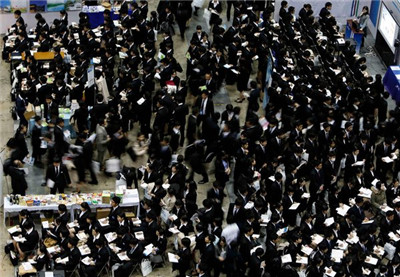(单词翻译:单击)
TOKYO — Over the last two years, the Japanese central bank governor, Haruhiko Kuroda, has accomplished what a string of more cautious predecessors had failed to do: reverse a prolonged and damaging slide in the price of goods and services in Japan.
东京——过去两年,日本中央银行行长黑田东彦(Haruhiko Kuroda)做到了他的一连串更为谨慎的前任未能做到的事:逆转了日本商品和服务价格那颇具破坏性的长期下滑。
But on Tuesday, Kuroda acknowledged that his aggressive campaign to create inflation — seen as crucial to rekindling growth in the world's third-largest economy — had stalled.
但周二,黑田东彦承认,他制造通胀的积极行动——被认为对于刺激这个世界第三大经济体的增长至关重要——已陷入停滞。

At a news conference after the central bank's latest monetary policy meeting, Kuroda said prices might turn “slightly negative,” meaning a return to deflation, or broadly falling prices, with which Japan has struggled since the late 1990s.
在日本央行最新的货币政策会议之后召开的一场新闻发布会上,黑田东彦称,物价可能会“小幅下降”,即回到通缩或价格普遍下降的状态。自上世纪90年代末以来,日本一直受到通货紧缩的困扰。
His comment followed an official assessment by the Bank of Japan that consumer prices would most likely stop rising “for the time being.”
黑田东彦发表上述评论之前,日本银行进行了官方评估,称消费者价格极有可能“暂时”停止增长。
It was the first time that Kuroda or his institution had formally acknowledged that prices were leveling off, although the bank's preferred measure of inflation has been declining for about a year.
这是黑田东彦及其所在机构首次正式承认物价正陷入停滞,不过,这家银行首选的通胀指标在过去一年左右的时间里一直在下降。
The bank predicted the lull in inflation would be temporary, however. It said in its assessment that prices would eventually start rising, spurred by low unemployment and rising incomes, though it did not say when that might happen. It chose not to modify the expansive bond-buying program it has been using to encourage inflation, keeping its target for purchases of government debt at 80 trillion yen, or about $660 billion, a year.
但是,日本央行预计通胀率增长停滞是暂时现象。这家银行表示,根据该机构的评估,受到低失业率和不断上升的收入水平的刺激,物价终将上涨,不过它没有表示会在何时上涨。这家央行决定不去修改它一直用来推动通胀的大规模债券购买计划,将继续保持一年购买80万亿日元(约合4万亿元人民币)政府债券的目标。
Kuroda was appointed Bank of Japan governor by Prime Minister Shinzo Abe in 2013, with a mandate to pull Japan out of deflation by whatever means necessary. He immediately ordered a sharp increase in the bank's bond buying, then expanded it again late last year.
黑田东彦2013年被任命为日本银行行长,受命采取一切必要手段让日本摆脱通货紧缩的漩涡。他上任后立即下令大幅增加央行的债券购买规模,并于去年年末再次扩大了购债规模。
Kuroda and his supporters argue that a “deflationary mindset” is behind many of Japan's economic woes. Weak consumer spending and a reluctance by investors and businesses to take financial risks are evidence of that, they say.
黑田东彦及其支持者称,“通缩思维”是日本许多经济问题背后的原因。他们说,疲弱的消费者支出,以及投资者和企业不愿承受金融风险就是证据。
Changing that mind-set has proved difficult. Kuroda's goal of achieving 2 percent inflation by the middle of this year is looking impossible. The consumer price index, or CPI, rose by just 0.2 percent in January.
事实证明,这种思维很难改变。黑田东彦设定的在今年中期通胀率达到2%的目标似乎已经无法实现。消费者价格指数,或CPI,在1月仅上涨了0.2%。
The main culprit has been the decline in oil prices that began last summer. It has had a paradoxical effect on Japan: Because the country relies heavily on imported energy, most economists agree the fall has helped the economy as a whole. Yet making gasoline and other mainstay energy-related items cheaper has made Kuroda's inflationary mission more difficult.
而其中的主要原因是从去年夏天开始的油价下跌。它在日本产生了相互矛盾的效果:由于该国严重依赖进口能源,多数经济学家认为,油价下跌总体而言对经济有益。然而汽油和其他主要能源相关产品价格下降,让黑田东彦的通胀目标更加难以实现。


